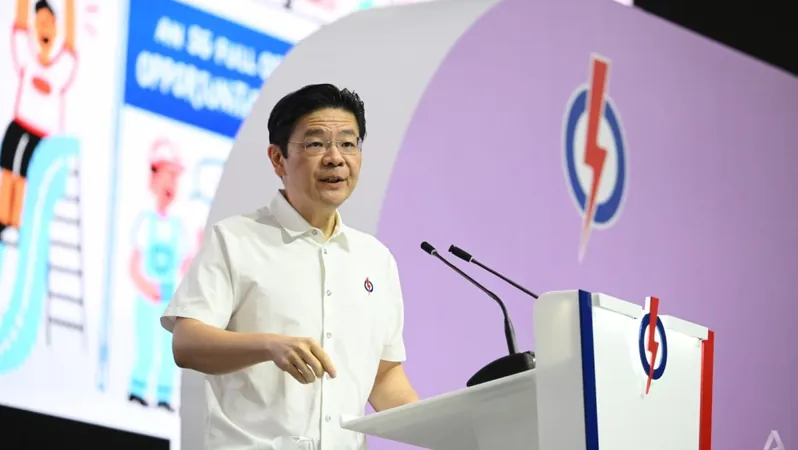
Lawrence Wong Urges PAP to Step Up Ahead of Crucial Elections: Is a ‘Wipe-Out’ Possible?
2024-11-24
Author: Jia
SINGAPORE: Context of the Current Political Landscape
As the ruling People’s Action Party (PAP) gears up for Singapore's next general election, deputy secretary-general and Prime Minister Lawrence Wong has emphasized that the party can no longer afford to keep a low profile. Addressing attendees at the PAP's biennial conference on November 24, Wong stressed that given the heightened stakes in this upcoming election, it is vital for the PAP to take a more proactive role.
Previously, the PAP could afford to operate quietly when the political landscape was less competitive. The government had a different mandate then, focusing on engaging with citizens, explaining its policies, and gathering public feedback. However, Wong is clear that the time has come for the PAP to 'come out in front' and champion its policies directly to the electorate.
Wong remarked, 'To mobilize citizens around the causes we believe in, to engage Singaporeans with the issues that matter to them, and importantly, to demonstrate why they can trust the PAP to lead Singapore into the future.'
Risks of Opposition and Potential Outcomes
He acknowledged the increasing desire among Singaporeans for a more vocal opposition, pointing out that some opposition leaders have warned of a potential 'wipe-out' for the PAP. Yet, Wong argues that the greater risk lies in potentially destabilizing the government and losing the long-standing stability that the PAP has provided.
Addressing concerns about opposition parties, Wong mentioned, 'The opposition themselves admit they are far from ready to form the government,' suggesting that their calls for support are less about governance and more about opposition for its own sake. He warned that even a modest swing in votes could spell trouble for the PAP, emphasizing the reality that close elections can lead to significant changes in political power.
With the potential to lose three to four Group Representation Constituencies (GRCs) and possibly four or five ministers—representing a quarter of the Cabinet—Wong fearfully stated, 'A weaker government would hinder our ability to resolve the challenges facing our people, especially in these uncertain times.'
PAP's Strategy and Future Leadership
Wong also took aim at opposition parties, suggesting that they were trying to capitalize on the frustrations arising from rising living costs. He highlighted that these inflationary pressures are global in nature and that the PAP has been attempting to shield Singaporeans from their worst impacts through various financial packages.
He highlighted the PAP’s successful track record over the last 15 elections, attributing it to their ability to deliver on promises made to voters. As elections draw near, Wong reiterated that the party's focus would be to assemble the strongest possible lineup, noting the challenges associated with attracting capable individuals to politics amid public scrutiny.
With a Cabinet that shows an average age exceeding 60 for over half of its members, Wong pointed out the urgency for trendsetting younger leaders to join politics. He expressed that many individuals he has approached for potential candidacy have been hesitant, preferring their current lifestyles over stepping into the political arena. Wong affirmed, 'I must act now to renew the team for the future.'
Conclusion: A Pivotal Moment for the PAP
Wong’s passionate appeal comes at a crucial moment as the PAP seeks to solidify its legacy amid rising competition. With traditional paths to leadership requiring time to cultivate, he stressed the necessity of starting the search for fresh, younger candidates who can eventually lead Singapore forward.
As the general elections loom closer, the party’s ability to successfully communicate its vision and garner public trust will undoubtedly play a crucial role in determining its future in Singapore's political landscape. The question on everyone's mind—will the PAP succeed in winning over the electorate once again, or will the tides turn for the opposition?

 Brasil (PT)
Brasil (PT)
 Canada (EN)
Canada (EN)
 Chile (ES)
Chile (ES)
 España (ES)
España (ES)
 France (FR)
France (FR)
 Hong Kong (EN)
Hong Kong (EN)
 Italia (IT)
Italia (IT)
 日本 (JA)
日本 (JA)
 Magyarország (HU)
Magyarország (HU)
 Norge (NO)
Norge (NO)
 Polska (PL)
Polska (PL)
 Schweiz (DE)
Schweiz (DE)
 Singapore (EN)
Singapore (EN)
 Sverige (SV)
Sverige (SV)
 Suomi (FI)
Suomi (FI)
 Türkiye (TR)
Türkiye (TR)